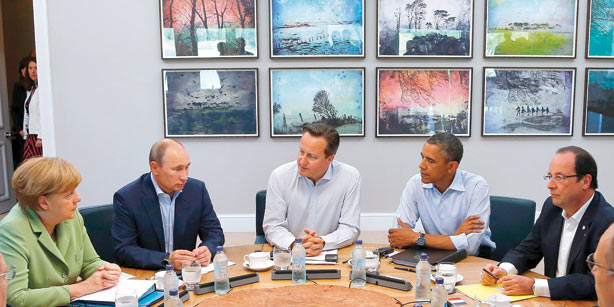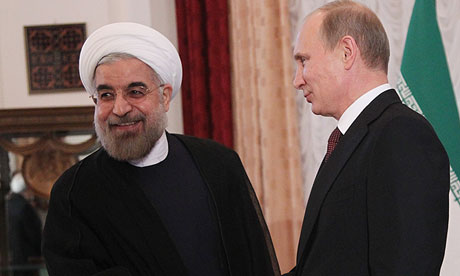Amb. Henry F. Cooper, Chairman . . . Lt. Gen. Daniel Graham, Founder
High Frontier . . Building Truly Effective Defenses . . Reagan’s Vision Lives
E-Mail Message 130918
Jaw-Jaw Better than War-War?
By Ambassador Henry F. Cooper
September 18, 2013
While the international community seems singularly focused on unrealistic diplomatic initiatives to eliminate Syria’s chemical weapons, other threats and associated dangers continue. Forgotten is the President’s promised retribution for Assad’s crossing a “red line” by using these weapons while an international gabfest proceeds and Russia’s influence grows. Promises of success in the Syrian enterprise are much overstated and related dangers are being understated. And more Middle East problems may be coming, especially concerning Iran.
Winston Churchill is credited with saying in favor of negotiations that “Jaw-jaw is better than war-war.” Maybe, especially if your name is Assad. But it’s not so clear from our perspective, especially since we have entered a “Theater of the Absurd” in discussing the merits of last week’s U.S-Russian “agreement.”
What Are We Gaining?
Notably, the agreement does not include Syrian President Bashar Assad, except as he does Russian President Putin’s bidding—and apparently forgotten is Assad’s alleged use of chemical weapons to kill over a thousand Syrians, including several hundred children. Whatever may be its temporary political benefits to the President (The “red line” in now drawn in invisible ink.), the long term consequences of this particular “jaw-jaw” are likely to be contrary to U.S. national security interests for a number of reasons including:
- So far, the only thing of note is that Assad finally admitted Syria has chemical weapons—not sure exactly what that is worth, given that, as I understand it, the estimates of their (1000 ton) stockpile are ours—not what Syria or Russia (which supplied some of Syria’s stockpile, by the way) have admitted.
- The ambitious (and laughably unrealistic) U.S.-Russian agreement was reported by the State Department to call for an inventory of Syria’s chemical weapons program within one week, with all components of the program to be out of the country or destroyed by mid-2014. Last Sunday in an interview with Britain-based ITN TV, Syrian Information Minister Omran al-Zoubi said Syria will comply with all U.N. Security Council resolutions (Wonder who is “jaw-jawing” away on some that Russia won’t veto?) and will facilitate the mission of the U.N. inspectors in line with the Russian-U.S. agreement.
- Perhaps most importantly, this so-called diplomatic breakthrough of a U.S.-Russian agreement simply cedes leadership in the Middle East (and elsewhere?) to the Russians, and we can expect them to lead in the interests of their alliances, including with their clients Syria, Iran, Hezbollah, etc. (Not to worry, we’re really “leading from behind.” Really???)
U.N. Help on Syria’s Weapons of Mass Destruction?
The theater of the absurd is not helped by a much anticipated United Nations report, released on Monday after Secretary General Ban Ki-Moon presented it to a closed meeting of the U.N. Security Council as the first official confirmation by scientific experts that chemical weapons were used in Syria’s civil war. Mr. Ban called the evidence indisputable . . . and it is, up to a point. The U.N. report supplements the widely proliferated TV reports with further “clear and convincing evidence” that chemical weapons—including sarin—were used on a relatively large scale in the widely reported rocket attacks on August 21, but without identifying who launched the attack.
The rebels and their U.S. and Western supporters blame Assad’s regime, while the Syrian government and its closest ally, Russia, blame the rebels—which include al-Qaeda and other jihadi groups. And In Geneva, the chairman of a U.N. war crimes panel, Paulo Sergio Pinheiro, said it is investigating 14 suspected chemical attacks in Syria and had not pinpointed the chemicals used or who is responsible. So, stay tuned on that question.
Meanwhile, Secretary of State John Kerry met in Paris with his counterparts, including from France, Britain, Turkey and Saudi Arabia, before seeking a U.N. resolution that would detail how the international community can secure and destroy Syria’s stockpile and precursor chemicals. Predictably, Kerry and Russian Foreign Minister Sergey Lavrov sparred over possible military action if Syria doesn’t abandon its chemical weapons—i.e., verifications and enforcement provisions not included in their widely touted agreement. Kerry and his French and British counterparts are reported to be working on a two-pronged approach to Syria involving: Enforceable U.N. benchmarks for eradicating the chemical weapons program (whatever that means), and an international conference bolstering the moderate opposition (more jaw-jaw).
So, where are we? While the jaw-jawing continues and the “red line” recedes into the background, more sober analyses will demonstrate what should have been (and probably was) obvious to the professionals participating in this farcical alleged diplomacy, as Marc Thiessen wrote in yesterday’s Washington Post. He really showed how to sum up the President’s policies in a single phrase, “conducting foreign policy by faux pas.” One can only wonder what will be next.
Syria Will Be a Long Row to Hoe.
It seems doubtful that Syria will completely abandon its chemical weapons stockpile anytime soon. Not only were we uncertain about their stockpiles before a couple of weeks ago, there are undoubtedly more uncertainties about them now because Syria probably began dispersing them while the President dithered between saying we were going to attack (with an “unbelievably small” attack, according to Secretary Kerry) and wherever he was as the American people let their representative know they were not to approve the his plans—whatever they were. Although Americans (and our allied publics) have drawn a sigh of relief, they should think about the world left behind.
David Kay, a friend accustomed to speaking truth to power, observed on a Sunday CNN news report that there is a “difficult” and “dangerous” path ahead to get hold and get rid of Syria’s chemical weapons. His views are based on many years of experience as a weapons inspector for the organizations to be charged with the inspections to verify an agreement that alleges to destroy Syria’s chemical weapons, if such an agreement is achieved. And he has witnessed first-hand how wrong our best intelligence can be. A little history might be instructive:
- Notably, after the 1991 Gulf War—Desert Storm, David led the inspectors who found an extensive covert Iraqi nuclear weapons development program, involving several thousand scientists, engineers and technicians, nearing Iraq’s first nuclear weapon—unbeknownst to the U.S. intelligence community and even the Israeli Mossad. That surprise no doubt contributed to the expectation that Saddam Hussein had stockpiled weapons of mass destruction (WMD) before the U.S.-led coalition attacked Iraq in 2003.
- But after that 2003 Gulf War—Iraqi Freedom, David had the unpleasant task of reporting personally to President G.W. Bush on his the fruitless search for Saddam Hussein’s WMD. Many now want to forget that almost everyone had signed on to the intelligence reports that Saddam did have such weapons—(a slam dunk, according to then CIA director George Tenet)—which he had used on his own people as well as Iranians. Now, maybe we will find some with Saddam’s fingerprints among Assad’s, if U.N. inspectors search in Syria—and those weapons don’t make their way out of Syria before discovery.
In a CNN interview last Saturday, David recounted our notable experience with Libya, which agreed to dismantle its chemical weapons nine years ago and is still not done—and Syria’s infrastructure is anticipated to be much larger and more complex, involving VX, sarin and other nerve agents. I’ve seen estimates that range between five and forty-five Syrian chemical weapons sites—and whatever was correct before the President announced his intention to attack Syria, that number has likely grown as Assad no doubt has dispersed his weapons—some estimate 1000 tons of chemical weapons. The more sites, the longer it will take to eliminate his stores. And the more likely that some will fall into the hands of Hezbollah (an ally of Syria not to mention Russia) and other jihadist groups.
Bottom line: It seems ludicrous to expect that Assad’s chemical (and possibly biological) weapons will be verifiably accounted for, much less removed or destroyed, by the middle of 2014, e.g., as reported by the New York Times if the agreement with Russia—not yet agreed with Syria—enters force. Expect lots more jaw-jawing as these facts sink in.
Implications for Iran.
From at least one perspective, all this “Jaw-jawing” may make war more likely—or at least make us more vulnerable to an emboldened Iran and to greater danger that a volatile Middle East will explode.
“Leading from behind” can be very dangerous here, as the newly empowered and emboldened Russian President Putin and President Obama interact with Iran’s alleged “moderate” new President Hassan Rouhani.
The Guardian reported that an exchange of letters between the President and Rouhani has set the stage for a possible meeting between the two at the U.N. next week in the first face-to-face encounter between a U.S. and Iranian leader since Iran’s 1979 revolution. And Putin and Rouhani are already allied (as well as with the leaders of Syria, China, Hezbollah and others) as we have previously discussed. And don’t forget that the real power in Iran is vested in Ayatollah Khomeini—who has sworn to destroy Israel and America.
In an indication of things to come, President Obama suggested on last Sunday’s ABC’s This Week (recorded on last Friday, before a final Syria deal with Russia was struck in Geneva) that Iran could join broader talks on Syria if Tehran recognized that events there are “destabilizing the entire region.” He linked the U.S.-Russia deal to more general talks involving Russia and Iran aimed at “some sort of political settlement that would deal with the underlying terrible conflict”—whatever that means. He suggested his decision to pursue diplomacy rather than to strike Syria illustrated a possibility for resolving the standoff over Iran’s nuclear aspirations peacefully without weakening U.S. resolve to stop the proliferation of weapons of mass destruction.
Obama said in the ABC interview, “I think what the Iranians understand is that the nuclear issue is a far larger issue for us than the chemical weapons issue, that the threat against … Israel that a nuclear Iran poses is much closer to our core interests. That a nuclear arms race in the region is something that would be profoundly destabilizing.” And he added his “suspicion is that the Iranians recognize they shouldn’t draw a lesson that [because] we haven’t struck [Syria] to think we won’t strike Iran.” Obama insisted: “What [Iran] should draw from this lesson is that there is the potential of resolving these issues diplomatically. You know, negotiations with the Iranians are always difficult. I think this new president is not going to suddenly make it easy. But you know, my view is that … if you have both a credible threat of force, combined with a rigorous diplomatic effort, that, in fact you can strike a deal.”
I trust that the President understands that the credible threat of much more than an “unbelievably small” attack is required to deter Iran. You think? What does Rouhani think? What must Israeli Prime Minister Netanyahu think?
Whatever . . . such reassurances, when combined with our meandering foreign policy initiatives, are not likely to encourage Israel that the U.S. has not weakened its commitment to prevent any Iranian attempt to build nuclear weapons, whatever they might say in public. Things must seem very lonely among Israelis when it comes to these concerns of approaching nuclear armed Iran, whatever is going on via the multilateral “jaw-jawing” enterprise.
Implications for America.
A nuclear armed Iran is far more important to our national security interest than other distractions associated with the Syrian debacle. Don’t imagine that Israel is the only nation threatened by Iranian nuclear arms. The United States is as well—particularly when such weapons are mated to ballistic missiles that can be launched from Iran or off our coasts to attack us. And as we have repeatedly pointed out we have significant vulnerabilities—particularly from a high altitude nuclear explosion over the United States that creates an electromagnetic pulse (EMP).
I repeat for emphasis, if/when Iran gets nuclear weapons and can mate them to ballistic missiles that they already have, they will pose an existential threat to the United States in any of the following ways:
- Nuclear-armed ICBM attacks over the North Pole—we need to strengthen our current defenses, especially for the Eastern Seaboard; congress is aware of this problem and pressing for improvements—though recent statements by Senator Carl Levin (D-Mich.), who chairs the Senate Armed Services Committee, suggest that funding for these programs may not be available in the appropriations currently being considered.
- Nuclear-armed satellite attacks over the South Pole—we are vulnerable to this mode of attack, which Iran (and North Korea) may have practiced; and this clearly possible threat appears to be being ignored.
- Nuclear-armed short, medium, or intermediate range missiles launched from vessels off our coasts—we are vulnerable to this mode of attack, but could employ Aegis ships normally near or on our coasts to provide limited defenses if we trained their crews to do so. Aegis Ashore sites, like those to be built in Romania and Poland, also could address this problem. The administration is supposed to address this issue next year in response to a congressional directive.
- Nuclear-armed short, medium or intermediate range missiles launched from the south—from the vessels in the Gulf of Mexico or from Latin America—and we are totally vulnerable and will require the deployment of effective defenses to counter such attacks. Aegis Ashore sites could provide this defense. The administration is also supposed to address this issue next year in response to the same congressional directive.
Any of these attack modes can detonate a nuclear weapon above the United States to create an EMP that could cause irreparable damage to the key large transformers of the electric power grid—and under certain well known conditions that could cause a complete failure of the electric power grid for an indefinite period. The ultimate result anticipated by credible experts could be that the consequent chaos would lead to the death of several hundred million Americans within the following year.
Thus, it is very important to harden the electric power grid so that if an attacking missile gets through the defense and detonates its nuclear weapon high above the United States, we will not lose our electric power indefinitely. If we can accomplish this hardening of the electric power grid, then we will have a good chance of reinstating other critical infrastructure upon which our survival depends. Such hardening will also protect us against EMP from the solar storms.
For a more complete summary of these issues, see our August 2nd email.
In addressing these concerns, it should be emphasized that the federal government’s first duty is to provide for the common defense. Providing effective missile defenses and hardening the electric power grid as quickly as possible should be a national priority.
High Frontier Plans.
We at High Frontier will continue to stick to our knitting, by seeking as quickly as we can to inform “the powers that be” of existential threats to the American people—as we have discussed in our emails for many months—and to urge them to “provide for the common defense” as charged by the Constitution they are sworn to uphold. Hopefully, key federal authorities and members of congress will soon begin to deal more effectively with the existential threat posed by natural and manmade electromagnetic pulse.
Key initiatives are to urge the Washington powers that be to undertake both the Shield Act and efforts to enhance our ballistic missile defenses, especially for our citizens on the East Coast and around the Gulf of Mexico, where they are completely vulnerable to ballistic missiles launched from vessels in the Gulf—or from Latin America, e.g., Venezuela.
But frankly, we have come to doubt that Washington will act in an expeditious way. Thus, we are also taking the message to grass roots America. Our local and state authorities need to understand these issues and what they might do if their federal representatives continue to fail “to provide for the common defense.” The end of this month, I will be in the Florida panhandle, seeking to advise the folks there of their absolute vulnerability against ballistic missiles launched from the Gulf of Mexico—and what can be done about it if only their representatives do their jobs.
In particular we will be observing that it would be wise for the Florida state legislature to follow Maine’s initiative and harden the electric power grid in Florida, while holding the Washington authorities accountable for their oath to provide for the common defense. Hopefully, in joining such an effort, other states will be encouraged for follow them.
And what can you do?
Join us at High Frontier in seeking to alert the public and your local and state authorities to the existential threats posed by both man-made and natural EMP events—and what can be done about these threats.
We can use your help in spreading this information to the grass roots and to encourage all “powers that be” to provide for the common defense as they are sworn to do. Will you do your part?
Begin by passing this message to your friends and suggest they visit our webpage, www.highfrontier.org for more information. Also, please encourage your sphere of influence to sign up for our weekly e-newsletter!
Please click here to read Past Weekly Updates!
Please click here to read past Flash Messages!
Please help High Frontier continue this important and timely work!
Be sure to follow us on our Social Sites!
If you found this letter via our Social Sites, and you would like to subscribe, click below!







